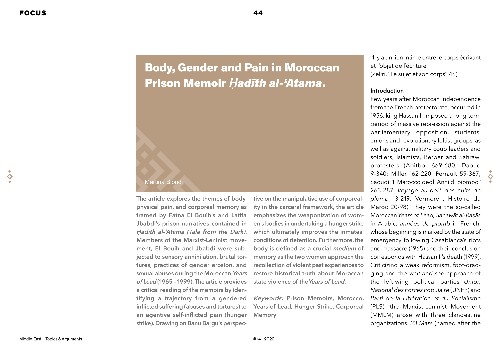Body, Gender and Pain in Moroccan Prison Memoir Ḥadīth al-‘Atama
The article explores the themes of body, physical pain, and corporeal memory as framed by Fatna El Bouih’s and Latifa Jbabdi’s prison narratives contained in Ḥadīth al-‘Atama (Tale from the Dark). Members of the Marxist-Leninist movement, El Bouih and Jbabdi were subjected to sensory annihilation, b...
Wedi'i Gadw mewn:
| Cyhoeddwyd yn: | Middle East - Topics & Arguments |
|---|---|
| Prif Awdur: | |
| Fformat: | Artikel (Zeitschrift) |
| Iaith: | Saesneg |
| Cyhoeddwyd: |
Philipps-Universität Marburg
2020
|
| Pynciau: | |
| Mynediad Ar-lein: | Mynediad Ar-lein |
| Tagiau: |
Dim Tagiau, Byddwch y cyntaf i dagio'r cofnod hwn!
|
| Crynodeb: | The article explores the themes of body, physical pain, and corporeal memory as framed by Fatna El Bouih’s and Latifa Jbabdi’s prison narratives contained in Ḥadīth al-‘Atama (Tale from the Dark). Members of the Marxist-Leninist movement, El Bouih and Jbabdi were subjected to sensory annihilation, brutal tortures, practices of gender erosion, and sexual abuses during the Moroccan Years of Lead (1965 – 1999). The article provides a critical reading of the memoirs by identifying a trajectory from a gendered inflicted suffering (abuses and tortures) to an agentive self-inflicted pain (hunger strike). Drawing on Banu Bargu’s perspective on the manipulative use of corporeality in the carceral framework, the article emphasizes the weaponization of women’s bodies in undertaking a hunger strike which ultimately improves the inmates’ conditions of detention. Furthermore, the body is defined as a crucial medium of memory as the two women approach the recollection of violent past experiences to restore historical truth about Moroccan state violence of the Years of Lead. |
|---|---|
| DOI: | 10.17192/meta.2020.14.8259 |
